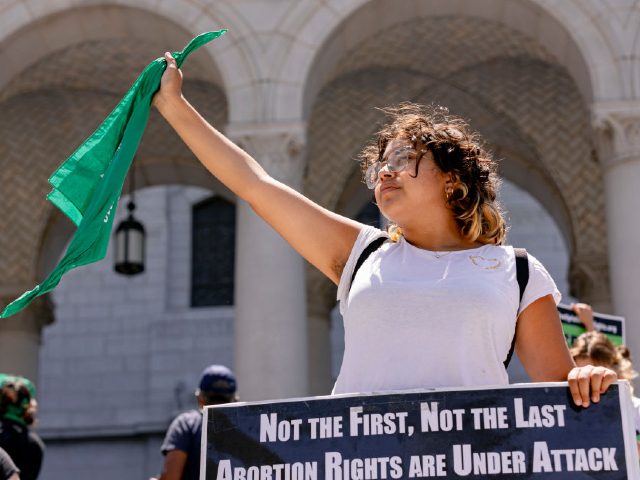In light of the Supreme Court’s recent overturning of Roe v. Wade, Teen Vogue published a piece advising its young readers on how to receive an abortion, access “abortion funds” to help pay for the procedure, and navigate new restrictions by crossing state lines, circumventing “paternalistic” parental consent laws, self-managing through medication, and avoiding “digital surveillance.”
The Thursday op-ed, titled “How to Get an Abortion if You’re a Teen After Roe v. Wade Was Overturned,” was penned by contributor Lauren Rankin, author of the recently released “Bodies on the Line: At the Front Lines of the Fight to Protect Abortion in America” that argues the right to abortion is a fundamental one.
If you are pregnant, under 18, and seeking abortion care, it can be hard to know where to turn, and to know what’s legal and what’s not. Here's everything you need to know ⤵️ https://t.co/4nhovwsfMw
— Teen Vogue (@TeenVogue) July 7, 2022
The essay, geared toward a younger audience, is an “update” of the publication’s 2019 “How to Get an Abortion If You’re a Teen” piece, guiding youth on “how to navigate abortion restrictions as a teenager” after the overturning of Roe v. Wade.
Though Rankin says the Court’s decision created “chaos across the country,” especially for “pregnant youth,” she emphasizes that “abortion is still legal in most states.”
“It is legal for minors to seek information about abortion care, and it is legal for you to travel to another state to have an abortion,” she writes, adding that some states may “criminalize providing abortion, but having an abortion does not inherently make you a criminal.”
The essay explains that if one lives in a state where abortion is banned, they will likely “need to travel to another state for an in-clinic abortion,” while listing which states require parental consent and which require minors to merely notify their parents.
For an updated list of “reputable, open abortion clinics,” the piece suggests the use of websites such as AbortionFinder.org, which provides information on abortion clinics and how to circumvent parental notification laws where such laws exist.
“Book an appointment with a clinic as soon as you can, as wait times will increase as more states ban abortion…,” Rankin recommends.
She also explains that young readers who are uncomfortable telling a parent about their decision can seek a “judicial bypass” where available.
A judicial bypass is a legal process that allows one “to go directly before a judge and get approval” for an abortion “rather than having consent from your parents,” Rankin continues.
“Yes, it’s paternalistic and unfair that you literally have to get permission from someone else to choose what to do with your body, but it is an option for legal abortion,” she writes.
Regarding traveling out of state for an abortion, the essay highlights that currently it is legal to do so, though “hostile states,” such as Missouri, seek to ban that as well.
For youth unable or unwilling to travel, Rankin says it’s possible to “safely self-manage an abortion” through medication:
The World Health Organization has specific guidance on self-managed abortion with pills up to 10 weeks of pregnancy. You can purchase medication abortion online through reputable sites like AidAccess.org or Plan C. Depending on your state’s current abortion laws, it could take a while for the pills to get to you, but it is worth going through a reputable provider to ensure that the medication you get is verifiable and safe.
Though the pills are considered safe, Rankin warns of the risk “in terms of criminalization,” adding that “women of color have already been prosecuted for their pregnancy outcomes, including stillbirths, miscarriages, and self-managed abortions, while Roe was still the law of the land.”
Offering tips on how to protect oneself from “digital surveillance,” especially for youth living in a state that banned abortion, Rankin insists readers “use a secure browser like DuckDuckGo and an encrypted messaging service like Signal.”
For those unable to afford the medical procedure and possible travel expenses, “abortion funds are here to help you,” the piece assures.
“Even if your state has banned abortion, abortion funds can still provide financial support, and they can help connect you to an abortion clinic in another state, or help you access medication abortion,” Rankin writes, noting that additional “support organizations” can help with costs.
The essay concludes by informing young people seeking abortion that they are not alone.
“There is a vast network of committed activists, providers, and organizers who are prepared to step in and help you access the care you need,” Rankin writes.
“No matter your age, you deserve access to safe, compassionate abortion care,” she adds.
The piece comes after the Supreme Court overruled Roe v. Wade last month, holding in the Dobbs case that the Constitution does not include a right to abortion and returning the issue of abortion laws and regulations to state legislatures.
The landmark decision has since sparked violent public upheaval across the country, as Democrats, the mainstream media, and members of the far-left continue their attacks on the pro-life movement and its supporters.
Last week, GOP lawmakers sounded off on the Biden administration directing teen mothers to abortion access online.
In June, Breitbart News reported that a new book for children under 13 titled “What’s an Abortion, Anyway?” aiming to normalize abortion as “another outcome of pregnancy,” will soon appear in abortion clinics and public libraries around the country.
In May, a Los Angeles high school was reported to have promoted an organization on their website that provides abortion resources to teens, even pointing out that students do not need parental permission for the lethal procedure.
Follow Joshua Klein on Twitter @JoshuaKlein.

COMMENTS
Please let us know if you're having issues with commenting.